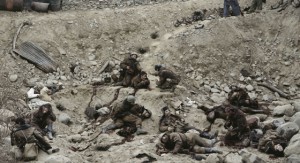By Cindy Sherman questions “whats real” shows the amount of realness and motivation a photographer has toward their work. Asking those questions shows how much heart is put into one photo. When Sherman questions whether she is herself or the role she has taken on in the photo makes it clear that she takes her work so seriously she doesn’t know herself. All of this definitely gives a new meaning to pictures don’t lie. From Photoshop to acting photography is changing. I believe it is not a bad thing to alter your picture in order to create your point and alter the perception of your viewer. Just because something is recreated doesn’t make it false, just because something is “loud” doesn’t make it absurd, in fact we do it all the time in our speech and explanations, its called exaggeration, which as we know just gets the point across.
Contact Information
Professor Sandra Cheng
Office: Namm 602B
Office Hours: Tu/Th 9-10 am or
by appointment
Office Tel: 718-260-5003
Email: scheng@citytech.cuny.eduHelpful Links
 New York Times Arts
New York Times Arts-
Recent Posts
Recent Comments
Archives
Categories
Meta




